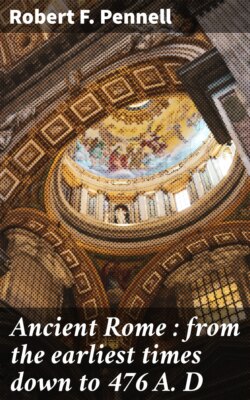Читать книгу Ancient Rome : from the earliest times down to 476 A. D - Robert F. Pennell - Страница 11
На сайте Литреса книга снята с продажи.
CHAPTER VI. THE CONSULS AND TRIBUNES.
ОглавлениеTable of Contents
At the close of the dynasty of the Tarquins, the regal form of government was abolished, and instead of one king who held office for life, two officers, called CONSULS, were elected annually from the PATRICIANS, each of whom possessed supreme power, and acted as a salutary check upon the other; so that neither was likely to abuse his power. This change took place towards the close of the sixth century before Christ.
In times of great emergency a person called DICTATOR might be appointed by one of the Consuls, who should have supreme authority; but his tenure of office never exceeded six months, and he must be a patrician. He exercised his authority only outside of the city walls. It was at this time, about 500, that the COMITIA CENTURIÁTA came to be the more important assembly, superseding in a great measure the COMITIA CURIÁTA.
We must remember that in this assembly all criminal cases were tried, magistrates nominated, and laws adopted or rejected. We must not forget that, since it was on a property basis, it was under the control of the patricians, for the great mass of plebeians were poor. Still there were many wealthy plebeians, and so far the assembly was a gain for this party.
About this time the Senate, which heretofore had consisted solely of Fathers of the families (Patres), admitted into its ranks some of the richest of the landed plebeians, and called them CONSCRIPTI. (Footnote: This is the origin of the phrase used by speakers addressing the Senate, viz.: "Patres (et) Consripti") These, however, could take no part in debates, nor could they hold magistracies.
In the Senate, thus constituted, the nomination of all magistrates made in the Comitia Centuriáta was confirmed or rejected. In this way it controlled the election of the Consuls, whose duties, we must remember, were those of generals and supreme judges, though every Roman citizen had the privilege of appealing from their decision in cases which involved life.
Two subordinate officers, chosen from the patricians, were appointed by the Consuls. These officers, called QUAESTÓRES, managed the finances of the state, under the direction of the Senate.
The wars in which the Romans had been engaged, during the century preceding the establishment of the Republic, had impoverished the state and crippled its commerce. This was felt by all classes, but especially by the small landed plebeians whose fields had been devastated. They were obliged to mortgage their property to pay the taxes, and, when unable to meet the demands of their creditors, according to the laws they could be imprisoned, or even put to death.
The rich land-owners, on the other hand, increased their wealth by "farming" the public revenues; i.e. the state would let out to them, for a stipulated sum, the privilege of collecting all import and other duties. These, in turn (called in later times Publicans), would extort all they could from the tax-payers, thus enriching themselves unlawfully. So the hard times, the oppression of the tax-gatherer, and the unjust law about debt, made the condition of the poor unendurable.
The military service, too, bore hard upon them. Many were obliged to serve more than their due time, and in a rank lower than was just; for the Consuls, who had charge of the levy of troops, were patricians, and naturally favored their own party. Hence we see that the cavalry service was at this time made up entirely of young patricians, while the older ones were in the reserve corps, so that the brunt of military duty fell on the plebeians.
This state of things could not last, and, as the opportunity for rebelling against this unjust and cruel oppression was offered, the plebeians were not slow in accepting it.
The city was at war with the neighboring Sabines, Aequians, and Volscians, and needed extra men for defence. One of the Consuls liberated all who were confined in prison for debt, and the danger was averted. Upon the return of the army, however, those who had been set free were again thrown into prison. The next year the prisoners were again needed. At first they refused to obey, but were finally persuaded by the Dictator. But after a well-earned victory, upon their return to the city walls, the plebeians of the army deserted, and, marching to a hill near by, occupied it, threatening to found a new city unless their wrongs were redressed. This is called the First Secession of the Plebs, and is said to have been in 494.
The patricians and richer plebeians saw that concessions must be made, for the loss of these people would be ruin to Rome. Those in debt were released from their obligations, and the plebeians received the right to choose annually, from their own numbers, two officers called TRIBÚNI PLEBIS, who should look after their interests, and have the power of VETOING any action taken by any magistrate in the city. This power, however, was confined within the city walls, and could never be exercised outside of them.
The person of the Tribunes was also made sacred, to prevent interference with them while in discharge of their duties, and if any one attempted to stop them he was committing a capital crime. Thus, if the Consuls or Quaestors were inclined to press the law of debt to extremes, or to be unjust in the levying of troops, the Tribunes could step in, and by their VETO stop the matter at once.
This was an immense gain for the plebeians, and they were justified in giving the name of SACRED MOUNT to the hill to which they had seceded.
The number of Tribunes was afterwards increased to five, and still later to ten.
